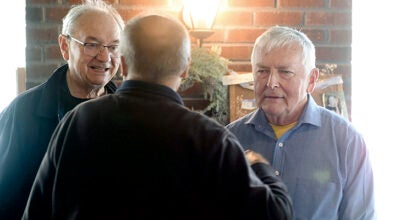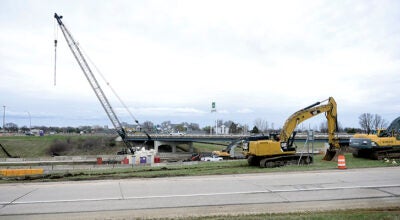Closing a Chapter
Published 7:51 pm Tuesday, May 2, 2023

- Riverland Community College President Adenuga Atewologun will soon be bringing his career in education to an end when he retires at the end of June. Eric Johnson/photodesk@austindailyherald.com
|
Getting your Trinity Audio player ready...
|
Riverland President Dr. Adenuga Atewologun set to retire after 10 years with Riverland
This past April, Dr. Adenuga Atewologun sat in the front of the small audience as Riverland Community College’s new president, Katherine Linaker, was introduced.
It was a prelude to the end of one story and the beginning of another as Atewologun prepares to close his book on a career that has spanned 40 years — 10 of which have been at Riverland.
“It is a full retirement,” Atewologun said from his office in Riverland’s East Building. “I’ve been in higher education for 40 years — in the classroom, dean, associate dean, vice president and president. It’s time to step aside and enjoy some R&R.”
Atewologun, known affectionately as Dr. Nuga by many, came to Riverland in 2013 with the intention of serving a stint of four to five years as many have, but as RCC began to build in that decade Atewologun found himself remaining in the president’s chair through June 30 of this year.
Linaker will take over on July 1.
“I think it’s better to hand it over now, when somebody can build on something positively rather than having to sort of reinvent or damage control things,” Atewologun said. “I’m hopeful that the next president will hit the ground listening and acting.”
During Atewologun’s time as president, Riverland has enjoyed an expansive growth on all three of its campuses — Austin, Albert Lea and Owatonna.
A number of advancements and changes helped make that growth a reality, but core to everything has been an effort to ensure the student enrolling at any one of the three sites had access to an education that prepared them for the future.
The heart of that has been a generated feeling of family, something Atewologun has taken great pride in.
“I’ve always stressed employees first,” he said. “Yes, people say students are the focus; I agree. The students are the center, but personally I put employees first … Employees buy into vision, then all those things translate into how we treat students, growth, outcome, community.”
Atewologun stressed that cohesiveness helped all people at the college come into a shared vision. While enrollment dropped at many institutions, RCC found its enrollment increasing.
That put RCC on a better base in a wide variety of areas including financially and graduating more students.
“It all comes back to having the right people in the right seats,” Atewologun said.
A piece of this has been a wide effort of collaboration with the communities the schools are in. In turn the partnerships have opened doors to educational opportunities as well as establishing the buildings as part of the communities themselves.
“I’m so proud that Riverland has become a common name and reference in Austin as well as in the other areas,” Atewologun said.
During Atewologun’s time, RCC has come to realize what many have already seen. A trend away from the necessity of four year degrees toward opportunities at two year schools, which RCC has excelled at.
Atewologun is quick to point out that there is nothing wrong with a four year degree, but adds that a two-year degree offers flexibility augmented by programs such as the Austin Assurance Scholarship in Austin, which offers Austin students a free education.
“The Hormel Foundation and Austin Assurance Scholarship have been a game changer for us,” Atewologun said. “It has shone focused light on the importance of people going from high school to a two-year education before considering something else.”
However, Riverland’s growth is more than Austin. Rather it’s the sum of all its parts. An extensive effort over Atewologun’s time to give all three sites their own identities.
One of the more visible aspects was the renovation of the Albert Lea campus coming out of a Capital Bonding Project to the scale of $10.2 million.
Albert Lea also became the home of the truck-driving program at Riverland and has worked to solidify it as the industrial, technology arm of Riverland.
Meanwhile, Owatonna has become a business-oriented campus with an accounting program that offers a four-year degree for working adults where RCC takes the first two years while students go online at Minnesota State University, Mankato for the final two years.
There’s more hope to further develop Owatonna after $1.95 million has been earmarked from congressional directed funds to create automation and robotics programs at their location.
“When I started, one thing I focused on doing in a full strategic plan was for us to try and build identities for each campus,” Atewologun said.
Like most everyone, the COVID-19 pandemic created stresses and challenges that Riverland had to overcome. But Atewologun looks at the pandemic with a certain amount of pride when he considers how RCC not only reacted to those challenges, but overcame them.
Riverland swiftly moved its education online and at the same time fine-tuned its work.
“COVID helped us improve on our online delivery,” he said. “It helped us invest in the technology to help us do even better in online technology.”
However, there is an underlying current to how RCC came out of the pandemic. The work that came before helped prepare the school for where it is now.
Atewologun has seen that first hand.
“The last thing we probably remembered we learned from COVID is that we are a resilient institution,” Atewologun said. “Riverland can pull together and solve problems innovatively. We can handle crises and still come out better. We can leverage crises to be innovative.
This has all led to a student centric mode of education with Atewologun pointing out that enrollment as a whole has gone up and within that students of diverse backgrounds have gone up from 11% to 26%.
“We have become a destination for diverse groups of students that are succeeding,” Atewologun said.
That’s not to say there haven’t been regrets. For instance, Atewologun laments that math and science haven’t progressed like he would have liked though he believes the pieces are in place.
The college also missed out on a capital bonding project that would have secured money to renovate Austin’s East Building.
Still, Atewologun looks back fondly on his time at Riverland, before he moves to Tennessee. He said that those things accomplished at Riverland will have a lasting impact on his life as well as the community he calls home.
“Austin has been a good, welcoming place to us,” he said. “We have formed lasting relationships, we have become friends with people we probably would not have met had we not come here.”
“Life is interesting,” he continued. “We are all parts and pieces of this global world. A tiny spec in the universe. I’m so thankful this community embraced us and nurtured us.”





